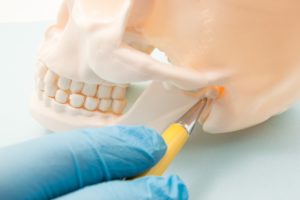
It’s estimated that over 10 million Americans are struggling with symptoms of TMJ disorder, which is a condition known to impact the function and comfort of your jaw joints and surrounding muscles. Fortunately, if you’re experiencing signs of this condition, even if you feel helpless, there are treatment options and professionals you can go to in order to help ease your discomfort and reclaim your life. In honor of November being TMJ Awareness Month, take the time to learn more about TMJ disorder and how to find relief.
What is TMJ Disorder?
TMJ stands for temporomandibular joints, which are the two jaw joints that connect your lower jaw to your skull. Due to a variety of reasons, like bite misalignment and bruxism, the joints and surrounding muscles can become tense and strained, causing symptoms like:
- Clicking and popping when you open and close your mouth
- Difficulty chewing food or speaking
- Ringing in the ear
- Vertigo
- Headaches and migraines
- Lockjaw
- Limited jaw movement and mobility
- Pain in the neck, shoulders, and face
- Stiffness in the jaw muscles
If you experience one or more of these symptoms or have underlying conditions associated with TMJ disorder, like teeth grinding, receiving an evaluation from a TMJ dentist is an excellent first step towards finding much-needed relief.
What Happens When TMJ Disorder Isn’t Treated?
It’s not uncommon for people to push off seeking treatment for their symptoms because they feel that there’s nobody that can help them, or they have never heard of TMJ disorder before. However, the longer the issue gets pushed to the side, the more that can develop. Many associated symptoms of this condition, like teeth grinding, can lead to an increased risk of oral health problems due to the wearing down of tooth enamel, like cavities and infections. Other chronic issues that could arise as a result of not receiving treatment include:
- Hearing problems, like muffled sounds or ear ringing
- Severe migraines and headaches that make it difficult to concentrate
- Facial swelling
- Uneven muscle development
Find Relief with TMJ Treatment
In order to find relief, it’s crucial to visit a knowledgeable expert, like a dentist. They will thoroughly evaluate the function of your jaw joints and help determine whether TMJ treatment is necessary. Depending on the underlying cause of your condition, they may recommend one of two popular solutions:
- Equilibration/Occlusal Adjustments: Teeth that are severely misshapen or past dental work that wasn’t fitted properly may need to be adjusted in order for an even bite to be achieved. This will allow the teeth to close together without putting additional pressure or strain on one TMJ.
- Occlusal Splint: To help shift the jaw joints into their ideal positions, as well as protect your teeth against nightly grinding, your dentist can recommend a customized orthotic device, called an occlusal splint.
With a knowledgeable expert by your side to help address your symptoms, you can experience life-changing relief from TMJ disorder. The first step is simple—just schedule a consultation!
About the Author
Dr. Holly Maier has been practicing for over 15 years in Shelburne, providing her patients with thoughtful, attentive, and whole-body health-focused dentistry. Over those years, she has helped countless patients address their TMJ pain with effective, customized treatments like occlusal adjustments and splints, offering long-term relief. For questions or to schedule a consultation, visit Shelburne Village Dentistry’s website or call 802-985-9700.
